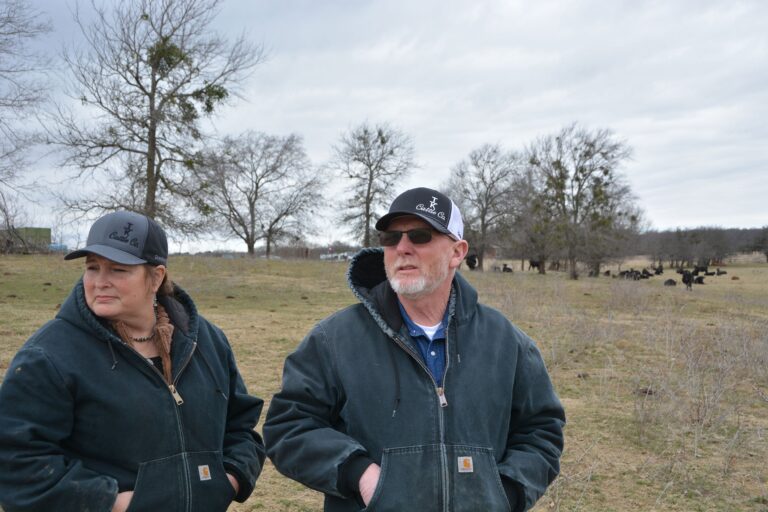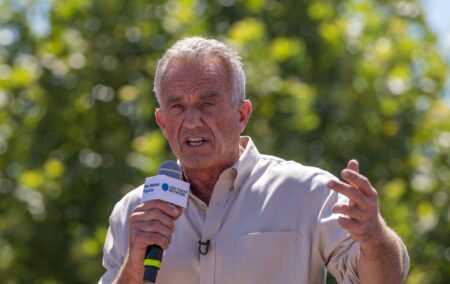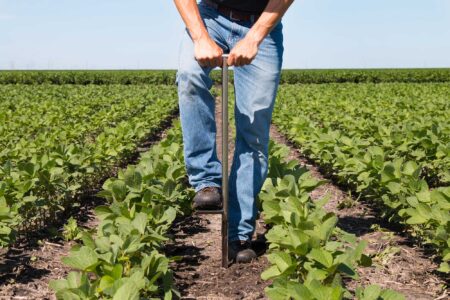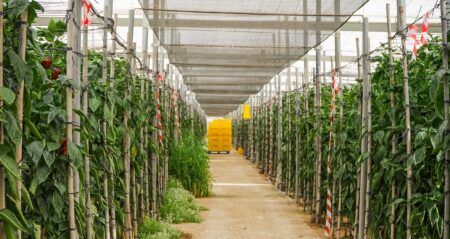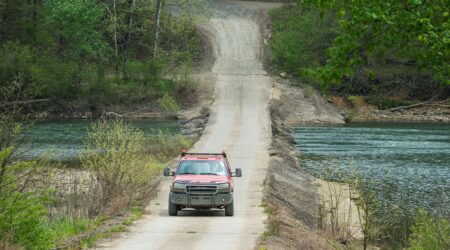GRANDVIEW, Texas — Tony Coleman walked around a small part of his family’s 325-acre pasture behind his rural house calling for “Tank.” A Black Baldy bull eventually meandered up, and Coleman started to rub the bull’s face.
“He just wants me to love on him,” Coleman said about the bull.
“Daddy’s baby boy.”
Tony and his wife, Karen, bottle-fed Tank in their garage after the bull’s mother died during birth. Talking about their poisoned land that has led to at least 47 cows and calves dying from problems like liver disease, the Colemans are emotional about their fear for Tank’s health.
“We became his mom and dad, and so for us, you know, I’ve grown up on the farm, and people have always said, ‘How do you eat what you raise?’ Well, for me, that’s just part of life,” Karen Coleman said. “It’s different to process a cow for your nutritional needs versus having to euthanize everything you have worked for. But if we have to euthanize that bull, that’s going to leave a hole that can’t ever be replaced.”
The Colemans are at the center of one of the most-watched environmental lawsuits in the country against the U.S. Environmental Protection Agency (EPA) and the company that offers biosolid fertilizer outside of Fort Worth, Texas.

The Colemans, Karen’s mother, Patsy Schultz, and their neighbors — James Farmer and Robin Alessi — shared their story with DTN, describing what they have faced since learning about the term “forever chemicals.”
Contamination on in Johnson County, Texas, has reached a point that the county commissioners court on Tuesday voted to request Gov. Greg Abbott declare the county a disaster area, which could lead to federal support for farmers impacted by long-term biosolid applications.
EPA sued in federal court
The Johnson County farmers along with their county government, the Maine Organic Farmers and Gardeners Association, and Potomac Riverkeeper Inc., have collectively sued EPA in federal court for failure to regulate per- and polyfluoroalkyl substances (PFAS) in biosolids, also known as sewage sludge.
PFAS make up a group of thousands of synthetic chemicals that are especially resistant to heat and water, leading them to be typically dubbed as “forever chemicals.” PFAS and associated chemicals — including PFOS and PFOA — accumulate over time in land, water, plants, fish, animals and people. EPA has classified them as likely carcinogenic, and they are known to concentrate in organs such as the liver, kidneys and gall bladder.
Over the past seven years, high contamination levels have shut down a dairy farm in New Mexico, at least one beef operation in Michigan and multiple farms across Maine — the only state so far to outright ban the use of biosolids as fertilizer. Michigan requires testing biosolids now before they can be applied to the land.
Based on 2022 data from larger facilities nationally, EPA estimates there are about 1.2 million tons of biosolids applied on farm ground nationally, and another 906,000 tons are used for home gardens, landscaping, golf courses and other uses.
Just because a wastewater plant produces sludge for biosolids doesn’t necessarily mean it is a high dose of forever chemicals, but cities with high volumes of chemical-related manufacturing are more likely affected.
Draft risk assessment issued by EPA
In one of EPA’s final acts under the Biden administration, the agency on Jan. 15 issued a draft risk assessment on PFAS chemicals in biosolids. EPA warned that the risks can exceed the agency’s safety levels “sometimes by several orders of magnitude.” EPA’s fact sheet for farmers recommended they “consider an alternative source of fertilizer from biosolids moving forward, especially if your farm might be vulnerable to PFAS impacts.” EPA cited both dairy and beef cows that graze pastures where sewage sludge was applied, as well as pasture-raised hens as risks, and vegetable operations.
“That’s what they are saying is don’t use biosolids because it is risky, which is a very surprising thing to have EPA say after all of this time,” said Mary Whittle, a Texas environmental attorney representing the Colemans, the Farmers and others. “I mean, they have had their heads in the sands, and as soon as they give it even the tiniest look, that’s when they see that our concerns are correct.”
Lawsuit in state court
In state court, the Colemans, Farmers and other neighbors are also suing the companies that applied sewage sludge from the Fort Worth wastewater treatment plant in surrounding counties — Synagro Technologies, and a smaller regional company, Renda Environmental Inc. Synagro contracts nationwide to dispose of sewage sludge, typically by applying it as biosolid fertilizer for farms. The lawsuit goes beyond PFAS to cite other chemicals typically found in biosolids as well.
In its 2023 annual sustainability report, Synagro acknowledged one of the industry’s challenges is trying to deal with “unwanted substances” such as PFAS. Synagro cited a new technology to treat wastewater called “SynaPure” that the company states can remove PFAS, heavy metals and other pathogens.
Synagro also suggested biosolids could be used for renewable energy projects such as sustainable aviation fuel.
Synagro did not respond to requests for comment.
Patsy Shultz and the Colemans
Karen’s mother, Patsy Schultz, and Patsy’s husband, Jim, bought the land in 2006 and built their home four years later. Jim Schultz was a mechanic who worked at a helicopter plant, and then at an electric company for 24 years. A farm boy from Kansas, he wanted a little land in a rural area and a few cows.
He found the perfect spot outside of Grandview.
“When you are out in a place like this, you don’t want to go back to the city,” Patsy Schultz said, looking out her back window to cows grazing outside.
Jim Schultz died of liver disease in 2018.
While they are in the middle of a highly technical and potentially groundbreaking lawsuit, the Colemans and the Farmers just see everything they worked for all their lives being destroyed in front of their eyes.
“We never even knew what PFAS was until spring of ’23,” Tony Coleman said. He added, “It’s a very complicated subject just trying to wrap your head around what PFAS and PFOS are.”
The Colemans and Farmers also didn’t actually apply biosolids on their land. Their contamination came from a farmer with property uphill from their land who received biosolids from Synagro but on at least one occasion left it stacked for weeks until he could get around to applying it.
Heavy rains and runoff would wash erosion down into the Colemans’ and Farmers’ land and shallow water table just off the large creek running by.
PFAs levels tested
After a stack of biosolids from Synagro was piled on the neighbor’s farm field in November 2022, it sat there for weeks and smoldered. The neighboring families complained about the stench. The Colemans and Farmers describe the kind of odor from the piles as the kind that would “knock a buzzard off a gut wagon.” James Farmer said it was like rotting carcasses.
“You would walk outside, and it would make you want to throw up,” he said.
After complaints and concerns, the county’s environmental investigator took soil samples, as well as samples from ponds and wells.
The soil tested as high as 6,291 parts per trillion (ppt) of PFAS chemicals. Patsy Schultz’s well water was 268 parts per trillion. Investigators came back and tested dead fish out of the Farmers’ pond that showed 74,460 ppt, and one of the Coleman’s stillborn calves tested at 620,228 ppt of PFAS.
To put that into context, if a person ate 8 ounces of fish out of Farmer and Alessi’s pond, the risk would exceed EPA’s recommended daily exposure levels by 30,000 times. If someone ate the liver from the calf, it would have been 250,000 times EPA’s recommended safety levels.
The county investigator then tested Synagro’s fertilizer and found 27 different PFAS chemicals with the sample hitting 35,610 ppt. High concentrations of at least eight different PFAS chemicals showed up on the Schultz/Coleman and Farmer properties.
Over that time, the Colemans also started losing cattle. They have lost 47 calves and cows in the last two years.
Calves are born stillborn or can die shortly after birth. The cattle often have very specific symptoms, Karen Coleman said. “At the end, they start having a very toxic gate, and you can just tell.” The cows also become more aggressive, even if they go lame and can’t get up. “It’s just heart-wrenching to know there’s nothing you can do. It’s just helplessness.”
Their dead cows now go to Texas A&M University for necropsies.
“All of the cows test positive for liver disease,” Tony Coleman said.
James Farmer and Robin Alessi
A stone’s throw down the road are James Farmer and his wife Robin Alessi. Like the Schultzes and Colemans, Farmer said he had worked his whole life to afford a small place in the country where he could raise a few animals in his spare time.
“I wanted to put in a peach orchard and a couple of other things out there, and now that dream is gone,” Farmer said. “I wanted to make something where I could just make a little profit off my land. Now I come home and think: Why do I want to waste time trying to take care of it anymore?”
Farmer and Alessi own a smaller piece of ground, about 17 acres, but would normally have about 10 cows on their land, along with a handful of horses, chickens, turkeys and peacocks. Their cows frequently co-mingle with the Colemans’ cattle, and they have faced the same challenges. They have had stillborn calves and cows that simply lose their ability to stand.
“They drop on their back ends, and they can’t get back up,” James Farmer said.
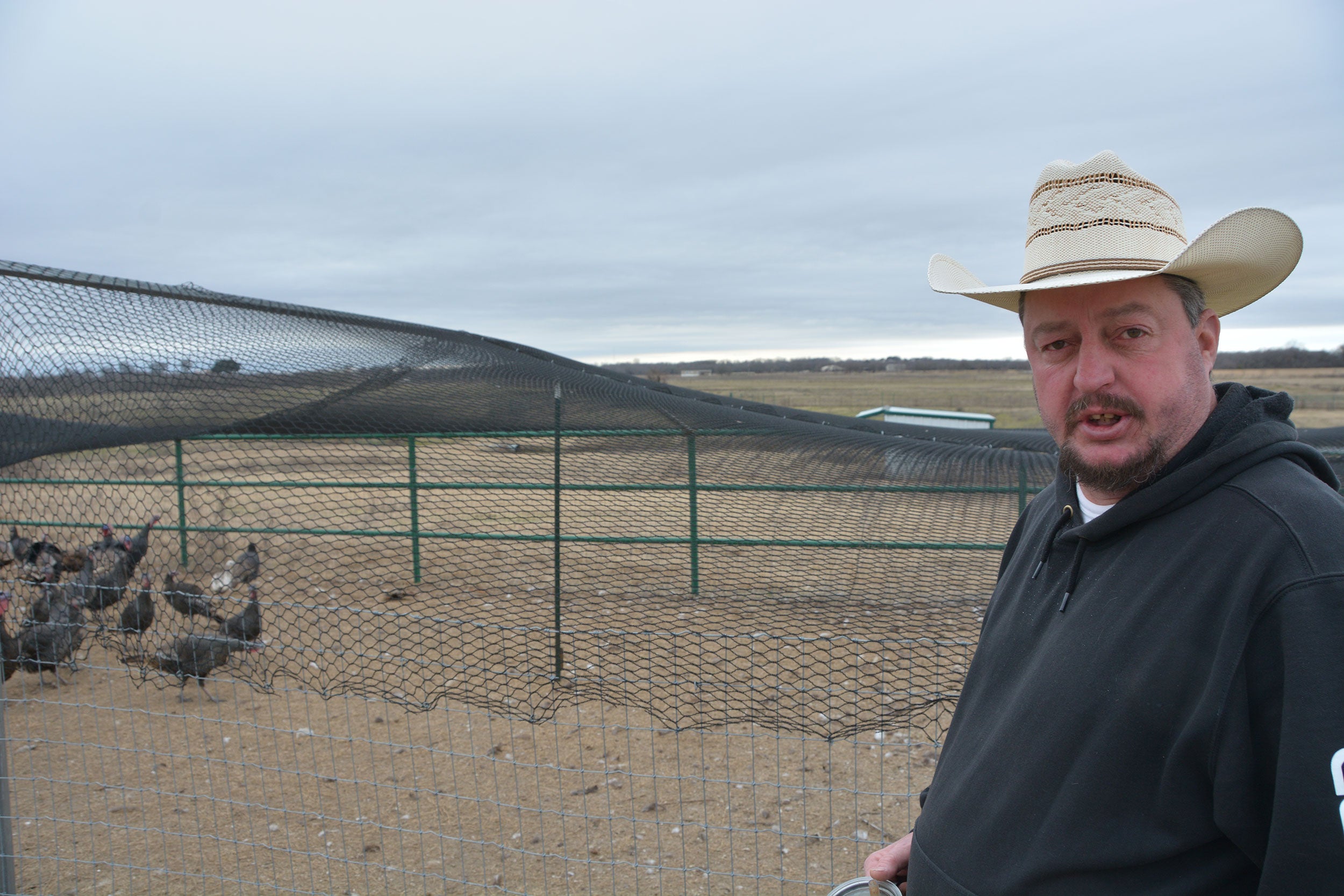

Robin Alessi loves horses and brought them from Alaska when she moved to Texas. They have lost four of them due to unexplained neurological issues. Two of them just laid down and died, while two others were euthanized.
“I’ve had some of the finest quarter horses you could ask for, all very well-mannered,” James Farmer said. “Now I’m afraid to go out there and get on a saddle with them. I’m afraid one will just fall over dead with me in the saddle and pin me down.”
Farmer and Alessi also have taken dead horses to Texas A&M for testing.
Johnson County seeks disaster declaration
The Johnson County Commission Court’s vote on Tuesday was the culmination of years of testing and warnings by county officials advising farmers not to use biosolids.
“The only way we can get federal assistance is through a governor’s disaster declaration,” said Larry Woolley, a Johnson County commissioner. “Until recently, we didn’t know if we were on solid ground to make that request.”
Woolley added, “This entire thing is being done to help the Colemans, the Farmers and whoever else to pursue federal assistance to euthanize their herds and dispose of the carcasses and hopefully figure out some kind of mitigation efforts on their land.”
The turning point for Johnson County officials came in December when Texas Attorney General Ken Paxton filed a lawsuit in the county court against 3M and former DowDuPont companies — two of the country’s largest producers of PFAS chemicals. Paxton’s suit was moved to federal court in Texas last month.
Woolley said county commissioners met with Texas Agricultural Commissioner Sid Miller in early January over the disaster request, and Miller expressed support for the idea.
“The timing is kind of perfect now that there have been two bills introduced in the current legislative session to test all biosolids intended for land application,” Woolley said.
The county’s resolution calls on Abbott to support the bills in the legislature.
Using biosolids as fertilizer is a longstanding practice in the county, Woolley said. He was an agricultural teacher and also worked with banks on determining collateral inventory for agricultural loans. He also recalled the “horrific smell” associated with fields where biosolids had been applied.
“It’s huge. We’re talking thousands of acres that have been applied.”
PFAS testing also isn’t cheap. Over the past few years, Johnson County has spent roughly $35,000 on testing for the chemicals.
The county wasn’t allowed access to the property near the Colemans and Farmers where PFAS was applied. But the county investigator took soil samples on the county road near the fence, which is where it recorded some of the highest levels in the soil.
“That’s just one isolated site where we have had significant death losses whether it is cattle or fish,” Woolley said.
Another future problem Johnson County faces is that more people are moving there. The population has grown 20% since the 2020 Census. People are selling tracts of land to developers who want to build in one of the few areas of open space left right outside of Fort Worth. A lot of those new homes will be using well water. “It’s a huge concern,” Woolley said.
Woolley also noted that before the Schultzes bought their ground, he also had his eyes on it.
“Every time I drove by there, I always thought, man, it’s a beautiful piece of property, but it was too big for me to acquire.”
State legislation to test biosolids
Johnson County got a new state representative in November, Rep. Helen Kerwin, a Republican. She has introduced legislation to test biosolids for at least 17 different forever chemicals before it can be applied. A companion bill was also filed in the Texas State Senate.
“I said right off the bat, I do not want to regulate anyone, but we certainly owe it to our farmers and ranchers to deal with this situation,” Kerwin said in an interview. She added, “The farmers and ranchers are unsuspecting as are so many other people about these forever chemicals. I think ag is going to be a big deal when it comes to PFAS in future standards.”
Kerwin also has new federal connections. Her daughter is Brooke Rollins, who is waiting for a U.S. Senate vote to become the new U.S. Agriculture secretary in the Trump administration. Kerwin said she was surprised when she visited the U.S. Capitol for Rollins’ confirmation hearing when senators, including Sen. Cory Booker, D-N.J., wanted to talk to her about PFAS contamination.
“He was the most passionate about it,” she said.
Uncertain future for Colemans, Farmers
After getting the test results nearly two years ago, the Coleman and Farmer families realized they couldn’t sell food from their farms anymore. They also shouldn’t eat fish from their ponds, and they had to install state-of-the-art filter systems on their water even though they no longer use it for drinking.
“There’s no law that says we can’t sell our cattle, but it’s human conscientiousness,” Tony Coleman said. “Why would I want to hurt your family by them eating something I sold? That would make us no better than the people who are producing this crap and coming out here and spreading it on someone else’s farm.”
He added, “It’s been like a nightmare. You do everything you can to try to raise the best beef you can because you want to get the best price for it. Who in their right mind came up with thinking that spreading waste from a city on farmland to grow food was a good idea?”
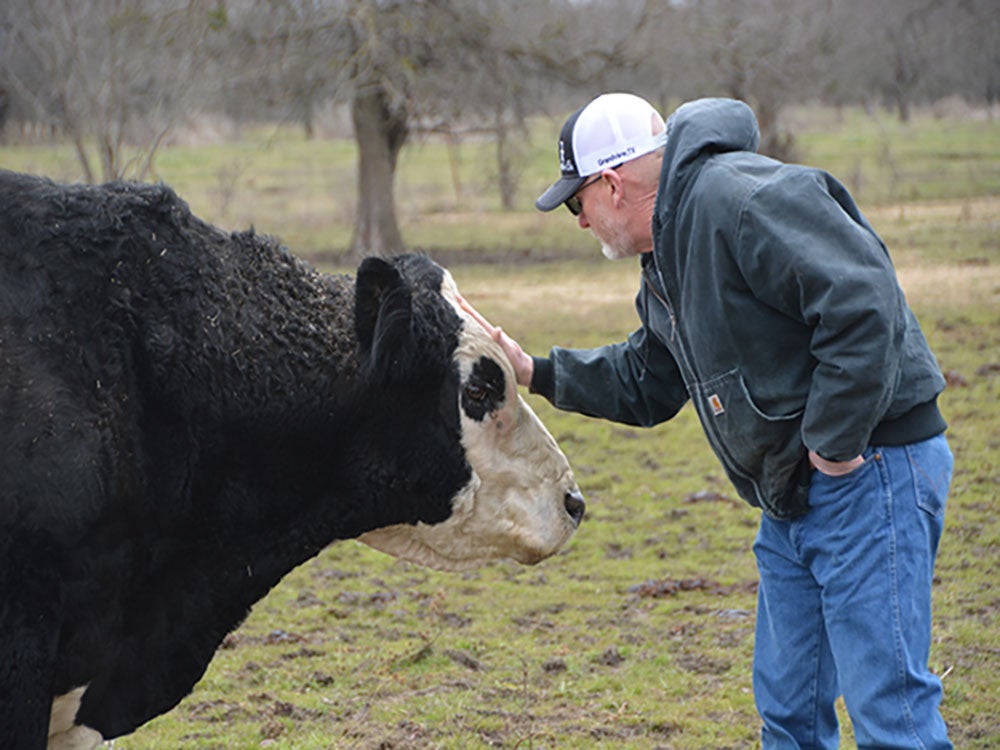

Karen Coleman has thyroid cancer, and she has had to have a mass removed from her back. Robin Alessi just got out of the hospital as well. She temporarily lost the use of her legs and needed weeks of physical therapy to regain their use. James Farmer said they all have health issues. And their circumstances take a mental toll.
“It scares the hell out of me,” James Farmer said. “I’m not a spring chicken anymore. She’s not. You go out and try to make something that you love and work for yourself and you can’t. You can’t survive on something that you can’t do anything with.”
James Farmer gets emotional talking about his family visiting the place. He built a pavilion around the pond shaded by trees to create a perfect fishing and BBQ spot.
“I have nephews and family that love to fish and want to come out here and have a fish fry, and I have to tell them we can’t eat the fish,” James Farmer said.
Robin Alessi added, “It’s really hard to explain that to a kid. So, we just throw them (the fish) back. We have to.”
On the day DTN visited the Colemans in late January, 300- to 400-pound steers were selling for $4.50 a pound.
“That’s huge, and for the last two years, we haven’t been able to sell anything. Meanwhile, cattle prices have been through the roof,” Tony Coleman said. “Because somebody else did something, it costs you everything you have worked for. That seems a bit unfair.”
This story was written by Chris Clayton, Ag Policy Editor with DTN, which publishes Progressive Farmer magazine. It was distributed via AP Storyshare as part of the Mississippi River Basin Ag & Water Desk, an independent reporting network based at the University of Missouri in partnership with Report for America, with major funding from the Walton Family Foundation.


:max_bytes(150000):strip_icc()/Jared-Strong-dry-soil2-04232ccb7f6b4e9cb0fcc2c0382d5358.jpeg)
:max_bytes(150000):strip_icc()/storm-1-10b68182a3584f0096888181821aed0c.jpg)


